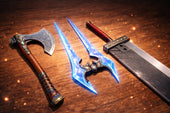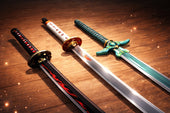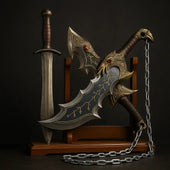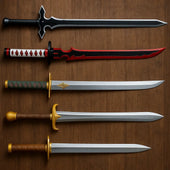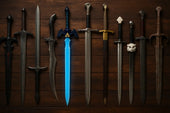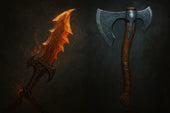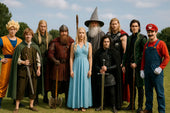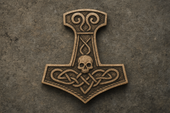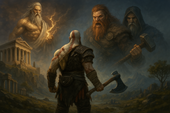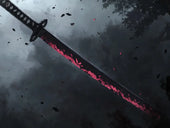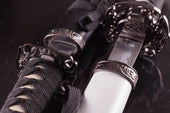Do people still believe in the Greek gods? For many, names like Zeus, Athena, and Apollo feel like characters in myths or stories we studied at school. Yet behind those myths lies a religion once followed by millions across the Mediterranean world, shaping everything from politics to daily rituals.
People do still believe in the Greek gods, though followers are few. Modern Hellenism, officially recognised in Greece, keeps the ancient faith alive, while mythology thrives in books, films, and games. Beyond religion, the gods remain powerful symbols of culture, storytelling, and timeless fascination worldwide.
Today, the question isn’t just one of history - it’s also about culture. Some still practise forms of Hellenic polytheism, while others find the gods alive in films, games, books, and collectibles. At The Sword Stall, where we bring mythology and fandom to life through high-quality replicas and collectibles, we often see how these ancient stories continue to spark curiosity and admiration.
The Ancient Roots of Belief
In the classical world, the Olympian gods weren’t just legends. They were central to Greek society. Farmers prayed to Demeter for good harvests, sailors offered sacrifices to Poseidon for calm seas, and cities built temples in honour of Athena, Apollo, or Zeus.
Religion in ancient Greece wasn’t about a single sacred text, but about rituals, festivals, and stories passed down through generations. Myths explained natural forces, taught moral lessons, and reinforced cultural values. The gods represented human virtues and flaws, making them relatable - and powerful - figures for worship.
Do People Still Worship the Greek Gods?
The answer is yes-some people still believe. Since 2017, Hellenism (also called Hellenic polytheism) has been recognised as a religion in Greece. Small but dedicated communities honour the Olympian gods, reconstructing rituals from ancient texts and archaeological evidence.
Practitioners hold ceremonies, celebrate festivals such as the Panathenaia or Dionysia, and even build altars or small temples. Outside of Greece, groups in the United States, Europe, and beyond are reviving the ancient faith. For them, worshipping the Greek gods is a way to reconnect with heritage, nature, and spiritual meaning. In ancient Greece, religion was woven into daily life, from farming to politics. The Olympian gods shaped society through myths, rituals, and festivals, guiding both public and private life (HistoryExtra offers a detailed guide to ancient Greek religion).
While not mainstream, this modern revival highlights how mythology isn’t just history - it’s living culture.
Greek Mythology in Pop Culture
Even if most people don’t literally worship Zeus or Artemis, their stories remain everywhere in modern life.
-
Books & Films: From Rick Riordan’s Percy Jackson novels to movies like Clash of the Titans, myths are retold for new generations.
-
Games: The God of War series brings Greek mythology into the hands of millions of gamers.
-
TV & Comics: Mythological figures appear in superhero comics, fantasy TV series, and countless adaptations.
These cultural retellings keep the gods relevant, reshaping them into modern icons. They fuel fandoms, cosplay, and collecting - bridging the gap between the ancient and the modern.
And that’s where collectibles come in. At The Sword Stall, you’ll find replicas inspired by myth and legend-swords, armour, and display pieces that bring your favourite stories from page or screen into your home.
Explore our Collectables range today →
The Cultural Legacy of the Greek Gods
Beyond belief and pop culture, the Greek gods continue to influence art, language, and philosophy. Think of phrases like “Achilles’ heel” or “herculean effort” - both rooted in myth. Architecture, sculpture, and literature across centuries draw inspiration from ancient Greece.
Even science and astronomy borrow from mythology: planets like Mars and Venus, or constellations such as Orion, keep Greek and Roman gods alive in the night sky.
This cultural footprint shows that mythology still shapes the way we understand the world, even if most people no longer treat the gods as literal deities.
Collecting Mythology: From Temples to Display Cabinets
In antiquity, devotion meant temples, sacrifices, and grand statues. Today, admiration often takes the form of collecting. From books and films to high-quality replicas, mythology inspires fans and collectors across the globe.
For many, a sword or shield replica isn’t just a decorative item - it’s a tangible link to epic tales and heroic figures. It’s a conversation starter, a display of fandom, and a way of celebrating the stories that shaped civilisation.
At The Sword Stall, we curate Greek-inspired pieces alongside fantasy and sci-fi collectibles, ensuring fans can build their own “modern shrine” to the myths and heroes that inspire them.
Bring Mythology Into Your Own Collection
The Greek gods may no longer command temples filled with worshippers, but their influence is far from gone. From modern practitioners of Hellenism to their presence in books, films, and games, these gods remain woven into our culture.
If you’re inspired by these timeless legends, why not bring a piece of mythology into your own home? The Sword Stall offers a wide range of Greek-inspired swords, armour, and collectibles that let you celebrate the stories that continue to fascinate the world.
Browse Greek-inspired pieces at The Sword Stall →
FAQs
Is Hellenism still practised today?
Yes. Hellenism, also called Hellenic polytheism, is still followed by small communities, particularly in Greece, where it was officially recognised as a religion in 2017. Worshippers honour the Olympian gods through rituals, festivals, and ceremonies.
Why are Greek gods still popular in modern culture?
Greek gods remain popular because their myths explore universal human themes like love, power, jealousy, and heroism. They also continue to inspire films, books, games, and collectibles, keeping them relevant in today’s world.
Are Greek mythology collectibles just for fans?
Not at all. Collectibles like replica swords and armour appeal to history enthusiasts, pop culture fans, cosplayers, and anyone who appreciates mythology’s artistry and symbolism.
What are examples of Greek mythology in everyday life?
Phrases like “Achilles’ heel” or “herculean effort” come directly from Greek myths. Planets and constellations are also named after Greek gods and heroes, showing how mythology still shapes language and science.
Where can I buy Greek-inspired swords and collectibles?
You can explore The Sword Stall’s dedicated range of high-quality replicas and collectibles, inspired by mythology, fantasy, and pop culture. We offer fast UK delivery and a carefully curated selection.





